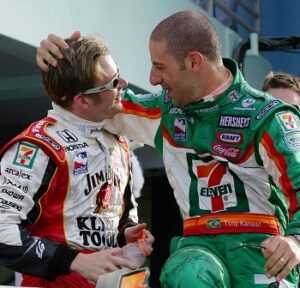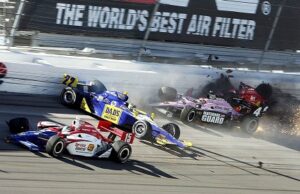The Lionheart
 In the summer of 2011, Dan Wheldon was on top of the auto racing world. He had just won his second Indy 500, and he was considered one of the greatest drivers of his generation. Then tragedy struck that fall at the season-ending race in Las Vegas – a track deemed too wide for Indy Car racing by almost every single driver on the circuit. Wheldon lost his life in a multi-car accident eleven laps from the start of the race.
In the summer of 2011, Dan Wheldon was on top of the auto racing world. He had just won his second Indy 500, and he was considered one of the greatest drivers of his generation. Then tragedy struck that fall at the season-ending race in Las Vegas – a track deemed too wide for Indy Car racing by almost every single driver on the circuit. Wheldon lost his life in a multi-car accident eleven laps from the start of the race.
New documentary
Now, documentary filmmaker Laura Brownson has given us “The Lionheart,” a film about the career and legacy of the famed British driver. Included are interviews with Wheldon’s father Clive, his wife Susie, and many well-known members of the racing community, including car owners Michael Andretti, Chip Ganassi, and Sam Schmidt, as well as drivers Dario Franchitti, Tony Kanaan, Bryan Herta, Scott Dixon, and others.
Included are the expected tales of a brash, young, cocky newcomer who took the racing world by storm when he arrived on the scene in the early 2000s. Andretti, Franchitti, Kanaan, and Herta tell of the comradery and brotherhood the drivers shared during their time together – which included Wheldon’s first Indy 500 win in ’05. We also learn of their disappointment when Wheldon jumped ship for a ride with competitor Chip Ganassi Racing following the 2005 season. Wheldon’s career was not all warm and fuzzy. He made enemies along the way, as well as friends.
Racing sons
Juxtaposed with these remembrances, Brownson includes the present-day story of the young go-karting careers of Wheldon’s sons, Sebastian and Oliver, who were very young when their father was killed. Typically, I don’t like the back-and-forth flashback technique filmmakers sometimes use to relate stories occurring in different time periods, but Brownson makes the Wheldon family story work. For example, she’ll follow an anecdote of one of Dan’s racing disappointments with a similar go-kart race involving one of the boys. Interspersed in all this are many interviews with Susie Wheldon, in which she explains that while she worries every time the boys race, she knows this is their way of honoring their father’s legacy.
 No father
No father
Particularly disheartening, we learn that Sebastian (the older son) regrets that he sees his competitors’ fathers wish their sons best of luck prior to the go-kart races, but Sebastian’s father is deceased. And Mom simply won’t do. Susie understands this, and smartly utilizes her racing connections. Tony Kanaan spends time roughhousing with the boys at their home, and Michael Andretti speaks earnestly to them about the pressure of having to live up to the high bar set by a champion-level father’s racing legacy. The inclusion of the boys’ story shows us the racing legacy of the Wheldon family, but it also serves as a constant reminder of the inherent danger of the sport.
Why this story?
I wonder, however, why Brownson decided to tell Wheldon’s story. Many drivers have lost their lives racing. Why is Wheldon’s story worthy of a feature length documentary? I don’t know the answer to that question, although I can say its past is so recent that Wheldon’s career and tragic death remain a part of most of our memories.
I would love to see a documentary on one of my favorite drivers, Mark Donahue. But he died in 1975. Wheldon’s death is recent enough that almost all his teammates and car owners are still alive and still active in the racing community. Kanaan, Franchitti, and Andretti are familiar to those with merely a passing knowledge of auto racing.
Accessible to all
And kudos to Brownson for making a documentary about a race car driver that also appeals to those who don’t know anything about racing. I felt the same way about Tim Burton’s “Big Eyes.” I know next to nothing about art, but I was captivated by his story of a husband-and-wife artist couple. Same with “The Lionheart.” Even for those without any kind of knowledge of auto racing, this is an excellent film.
Andy Ray‘s reviews also appear on https://youarecurrent.com/category/nightandday/film-reviews/.